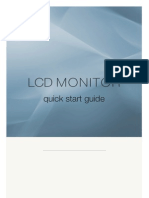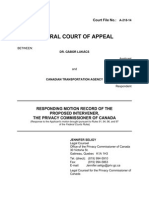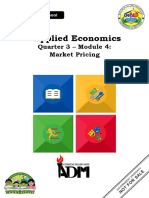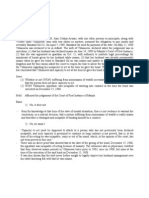LIS S652 Lamb
LIS S652 Lamb
Uploaded by
ella palomaCopyright:
Available Formats
LIS S652 Lamb
LIS S652 Lamb
Uploaded by
ella palomaOriginal Description:
Original Title
Copyright
Available Formats
Share this document
Did you find this document useful?
Is this content inappropriate?
Copyright:
Available Formats
LIS S652 Lamb
LIS S652 Lamb
Uploaded by
ella palomaCopyright:
Available Formats
Course
Syllabus
Fall 2017
S652 Digital Libraries
Indiana University-Purdue University at Indianapolis (IUPUI)
School of Informatics and Computing - Dept. of Library and Information Science
From schools and universities to public libraries and government agencies, a wide range of
institutions are building digital libraries. Whether providing access to digital collections,
institutional repositories, or other types of digital information services, library and
information science professionals are needed to design, develop, and manage these
emerging digital information sources and services. Information professionals may also
collaborate with individuals, communities, and corporations in creating digital collections.
This course explores both the theory and practice of digital libraries in academic, research,
community, government, and other settings. Topics include deKinitions; digital objects (e.g.,
digitization processes, archiving, preservation); acquisitions and collection development;
organization and representation of information (e.g., metadata, ontologies, classiKication,
description); information architecture; information access, user behavior and interaction;
services, management, and evaluation; issues (e.g., intellectual property, privacy, social,
economic, sustainability); evolving technologies; and research agendas.
Instructor Contact Information
Name - Annette Lamb, Ph.D.
Address – P.O. Box 206 Teasdale, Utah 84773
Email - anlamb@iupui.edu
Phone - If you’d like to have a phone conversation, contact Dr. Lamb for a phone number.
Website - http://eduscapes.com
Course Description
Catalog Description: This course introduces digital libraries — networked information
servers that provide access to multimedia data for local and remote users. Primary
emphasis is on developing digital libraries, based on understanding tools for presentation
and manipulation of multimedia as well as analysis of user needs.
The course will be taught entirely online including web-based readings and resources,
threaded discussions, plus online presentations and activities.
The following entry skills are required for this course:
• Demonstrate technology skills including use of productivity tools (i.e., word
processing, spreadsheet, presentation), web development tools, social
media, and utilities (i.e., downloading drivers and plugins).
• Identify, select, access, and evaluate information found on the Internet and in
the library.
• Use Canvas for discussions and information sharing.
S652 Syllabus Digital Libraries Page 1
You must complete S501, S502, and S503 prior to taking this course. It is strongly
recommended that you complete S532 Information Architecture and S634 Metadata prior
to taking this course.
This course makes the assumption that students are able to work independently. There are
no required face-to-face meetings. There are no required synchronous online meetings.
However, students are encouraged to e-mail or arrange a chat with the instructor at any
time.
Learning Objectives
Students will be able to:
• DeKine digital libraries including digital library types, collections, and resources.
• Identify the essential components and relationships involved in digital libraries.
• Distinguish among traditional library resources, digital collections, digital
libraries, and related terms.
• Discuss connections with disciplines and enterprises as well as the personal
digital collections.
• Discuss differing conceptions, expectations, visions, and approaches to digital
library development and implementation.
• Categorize and describe digital libraries by resources, specialties, disciplines,
institutions, and audiences.
• Evaluate digital libraries and digital collections.
• Identify the audiences and stakeholders associated with digital libraries.
• Describe the foundations of digital library research and development.
• Identify key sources of information about digital libraries.
• Discuss the major issues in digital library research.
• Discuss the major issues in the development and management of digital
libraries.
• Apply digital library technologies software for digital library development.
• Organize digital library content.
• Describe the digitization process including preservation.
• Identify the range of objects both physical and digitally born that may be
incorporated into a digital collection to meet digital library goals.
• Demonstrate skills in working with digital objects (textual documents, images,
audio, video).
• Apply technology tools to digitize materials.
• Discuss the pros and cons of various Kile formats.
• Compare digital representation formats for textual, image, audio, and video
materials.
• Demonstrate practical skills and theoretical concepts related to digital library
planning, development, organization, management, use, and preservation.
• Develop and implement plans for user access to library library content.
• Apply guidelines associated with digitization (e.g., best practices, Kile formats,
digital objects, protocols).
S652 Syllabus Digital Libraries Page 2
• Implement metadata standards associated with digital libraries.
• DeKine and apply controlled vocabularies.
• Discuss concepts in data and digital object interoperability, use, and reuse.
• Discuss digital archiving and preservation of both physical and digitally born
objects.
• Describe user behavior in a digital library environment.
• Develop a prototype digital library collection.
• Address legal, ethical, economic, and social issues and challenges associated
with digital libraries (e.g., interoperability, customization, personalization,
digital preservation, copyright, privacy).
• Describe and give examples of how the copyright law applies to digital libraries.
• Discuss approaches to digital library services including access and use.
• Discuss the past, present, and future of digital libraries.
• Describe the constantly changing nature of digital environments and the
implications for library and information science professionals.
• Analyze the research literature on digital libraries.
MLS Program, Graduate Program and ALA Competency Connections
This course addresses competencies related to the MLS program in the following areas:
• Assist and Educate Users
• Apply Management and Leadership Skills
• Work Effectively Within and Across a Variety of Organizational Structures
• Conduct and Analyze Research
• Demonstrate Basic Technical Expertise
• Approach Professional Issues with Understanding
This course is connected to the Principles of Graduate and Professional Learning in the
following areas:
• Demonstrating mastery of the knowledge and skills expected for the degree and
for professionalism and success in the Kield
• Thinking critically, applying good judgment in professional and personal
situations
• Communicating effectively to others in the Kield and to the general public
• Behaving in an ethical way both professionally and personally
This course addresses a number of ALA competencies. According to ALA (2009), a person
graduating from an ALA-accredited master’s program in library and information studies
should know and, where appropriate, be able to employ:
• Foundations of the Profession
• Information Resources
• Technological Knowledge and Skills
• Reference and User Services
• Administration and Management
S652 Syllabus Digital Libraries Page 3
Course Materials
The course content will be accessed through a series of web pages. In addition to readings
and presentation materials, the pages also contain reKlective questions and individual
exercises to reinforce key concepts.
NO textbook is required.
Course Assignments and Assessments
The learning objectives will be assessed through a series of activities and discussions.
Course assignments are intended to help you apply the course materials.
Spark Projects
The course contains six Spark assignments worth between 10 or 20 points each. These
"Sparks" are intended to ignite learning and help you apply the course materials to a
project environment. These projects bridge theory and practice so you'll need to connect
your course readings with real-world problems. The Sparks will be shared in the
DISCUSSION area of Canvas.
• Spark 1: Breadth and Depth (10 Points)
• Spark 2: Personal Digital Object Collection (20 Points)
• Spark 3: Prototype Project (10 Points)
• Spark 4: Digital Library Investigation (10 Points)
• Spark 5: Issue or Specialization (10 Points)
• Spark 6: Real-world Connection (10 Points)
Bridging Theory and Practice Assignment
The course also contains a series of 15, 2-point short “Bridging Theory and Practice"
assignments that help you connect digital libraries with the course readings. They are
worth a total of 30 points. Some of these activities are drawn from the "Try It" activities
woven into the course materials. You'll keep a log of the activities you complete and turn in
one document near the end of the semester. However, I highly recommend that you work on
these assignments week-by-week as you do the readings. This requirement will be shared
in the ASSIGNMENT area of Canvas.
Course Grades
The points awarded for each activity are indicated on the Course Requirements. High
expectations have been set for this course. Please notice that outstanding achievement will
require careful attention to course criteria and exceptional quality in course assignments.
Final grades are based on the following range within the total 100 points possible:
S652 Syllabus Digital Libraries Page 4
A 98-100
A- 95-97
B+ 92-94
B 89-91
B- 86-88
C 80-85
D 75-79
F below 74
The meaning of the letter grades follows the SLIS Grading Policy:
A: Outstanding achievement. Student performance demonstrates full command of the
course materials and evinces a high level of originality and/or creativity that far surpasses
course expectations. The grade of A+ is not granted in SLIS, except in very exceptional
cases.
A-: Excellent achievement. Student performance demonstrates thorough knowledge of the
course materials and exceeds course expectations by completing all requirements in a
superior manner.
B+: Very good work. Student performance demonstrates above-average comprehension of
the course materials and exceeds course expectations on all tasks deKined in the course
syllabus.
B: Good work. Student performance meets designated course expectations, demonstrates
understanding of the course materials, and has performed at an acceptable level.
B-: Marginal work. Student performance demonstrates incomplete understanding of
course materials.
C+, C, C-: Unsatisfactory work and inadequate understanding of course materials.
D+, D, D-: Unacceptable work; course work completed at this level will not count toward
the MLS degree.
F: Failing. May result in an overall grade point average below 3.0 and possible removal
from the program.
Late and Incomplete Work
Students may request an assignment extension due to personal or professional
emergencies. These requests must be made prior to the due date. Extensions beyond a
couple days will result in lose of points.
S652 Syllabus Digital Libraries Page 5
A Kinal grade of "I" or "Incomplete" will NOT be given except in extreme situations. Please
let me know if you're having difKiculty completing the requirements of this course.
IUPUI Mission Statement
The Mission of IUPUI is to provide for its constituents excellence in
Teaching and Learning; Research, Scholarship, and Creative Activity; and Civic Engagement.
With each of these core activities characterized by
Collaboration within and across disciplines and with the community;
A commitment to ensuring diversity; and
Pursuit of best practices.
IUPUI’s mission is derived from and aligned with the principal components—Communities
of Learning, Responsibilities of Excellence, Accountability and Best Practices—of Indiana
University’s Strategic Directions Charter.
IUPUI Values Statement
IUPUI values the commitment of students to learning; of faculty to the highest standards of
teaching, scholarship, and service; and of staff to the highest standards of service. IUPUI
recognizes students as partners in learning. IUPUI values the opportunities afforded by its
location in Indiana’s capital city and is committed to serving the needs of its community.
Thus, IUPUI students, faculty, and staff are involved in the community, both to provide
educational programs and patient care and to apply learning to community needs through
service. As a leader in fostering collaborative relationships, IUPUI values collegiality,
cooperation, creativity, innovation, and entrepreneurship as well as honesty, integrity, and
support for open inquiry and dissemination of Kindings. IUPUI is committed to the personal
and professional development of its students, faculty, and staff and to continuous
improvement of its programs and services.
Student Academic Conduct
There is extensive documentation and discussion of the issue of academic honesty in the
IUPUI Student Code of Conduct.
Students should be sure to read the Student Code of Conduct. The Academic Handbook
states that faculty members have the responsibility of fostering the “intellectual honesty as
well as the intellectual development of students.... The faculty member should explain
clearly the meaning of cheating and plagiarism as they apply to the course… Should the
faculty member detect signs of plagiarism or cheating, it is his or her most serious
obligation to investigate these thoroughly, to take appropriate action with respect to the
grades of students, and in any event to report the matter to the Dean of Students. The
necessity to report every case of cheating, whether or not further action is desirable, arises
particularly because of the possibility that this is not the student’s Kirst offense, or that
other offenses may follow it. Equity also demands that a uniform reporting practice be
enforced; otherwise, some students will be penalized while others guilty of the same
actions will go free.” (p. 172). For more information, go to http://www.iupui.edu/code
S652 Syllabus Digital Libraries Page 6
Student Accommodations for Disability
The Americans with Disabilities Act (ADA) is a federal anti-discrimination statute that
provides comprehensive civil rights protection for persons with disabilities. Among other
things, this legislation requires that all students with disabilities be guaranteed a learning
environment that provides for reasonable accommodation of their disabilities.
Students needing accommodations because of disability must register with Adaptive
Educational Services and complete the appropriate form before accommodations will be
given. The AES ofKice is located in Taylor Hall Room 127, 815 W Michigan St Indianapolis, IN
46202 and may be reached by phone 317/274-3241 or 317/278-2052 TTD/TTY; by fax
317/274-2051; or by email aes@iupui.edu
For more information, go to http://diversity.iupui.edu/aes/
Administrative Withdrawal
A basic requirement of this course is that you will participate in class and conscientiously
complete writing and reading assignments. Keep in touch with me if you are unable to
attend class or complete an assignment on time. If you miss more than half our class
assignments within the Kirst four weeks of the semester without contacting me, you will be
administratively withdrawn from this section. Our class has assignments each week; thus if
you miss more than three assignment in the Kirst four weeks, you may be withdrawn.
Administrative withdrawal may have academic, Kinancial, and Kinancial aid implications.
Administrative withdrawal will take place after the full refund period, and if you are
administratively withdrawn from the course you will not be eligible for a tuition refund. If
you have questions about the administrative withdrawal policy at any point during the
semester, please contact me.”
Learn more at http://registrar.iupui.edu/withdrawal-policy.html
S652 Syllabus Digital Libraries Page 7
Course Topics and Calendar
Week 1
Overview of Digital Libraries
Week 2
Collection Development and Preservation
Week 3-4
Digital Objects (textual documents, images, audio, video)
Week 5-6
Organization and Representation of Information
Week 7-8
Information Architecture
Week 9
Information Access, User Behavior and Interaction
Week 10
Services
Week 11
Management and Evaluation
Week 12
Issues
Week 13
Digital libraries and the future
S652 Syllabus Digital Libraries Page 8
You might also like
- INST 784 Digital Preservation 2018Document17 pagesINST 784 Digital Preservation 2018Trevor OwensNo ratings yet
- Week 10 - Module-2 PPT - Library & Information Science Research Trends & Issues PDFDocument42 pagesWeek 10 - Module-2 PPT - Library & Information Science Research Trends & Issues PDFMrutyunjaysethy67% (3)
- KalyaniDocument32 pagesKalyaniSrinivas KrishnaNo ratings yet
- Deluxe Murphy Bed Plan FullDocument22 pagesDeluxe Murphy Bed Plan Fullperffecto100% (4)
- Institutional RepositoriesDocument51 pagesInstitutional RepositoriesRamesha BangaloreNo ratings yet
- Library System Thesis PhilippinesDocument8 pagesLibrary System Thesis Philippinesheidiowensspringfield100% (2)
- 9214-1Document19 pages9214-1HAMID RAZANo ratings yet
- Digital Libraries & Children's Libraries: © Malore I. Brown, Ph.D. Rutgers University Maloreb@scils - Rutgers.eduDocument36 pagesDigital Libraries & Children's Libraries: © Malore I. Brown, Ph.D. Rutgers University Maloreb@scils - Rutgers.edumarios1981No ratings yet
- Lecture 3: Role of Academic Librarian: Prof. Dana P. TugadeDocument34 pagesLecture 3: Role of Academic Librarian: Prof. Dana P. Tugadecristine bergado100% (1)
- Content Ind AssignmentDocument5 pagesContent Ind AssignmentPzah HamsaniNo ratings yet
- MarcoSeiferleValenciaCV ForWebDocument6 pagesMarcoSeiferleValenciaCV ForWebMarco SVNo ratings yet
- Coursework For Library ScienceDocument7 pagesCoursework For Library Sciencebcqta9j6100% (2)
- Library ManagementDocument9 pagesLibrary Managementchandu06ashaNo ratings yet
- ESTER RESEARCH PROPORSAL NEWDocument33 pagesESTER RESEARCH PROPORSAL NEWNasri BalecheNo ratings yet
- Assignment 1Document6 pagesAssignment 1Laiba MureedNo ratings yet
- Online Library System Thesis PhilippinesDocument8 pagesOnline Library System Thesis PhilippinesHelpWithWritingAPaperForCollegeFargo100% (1)
- Planning Digital LibrariesDocument14 pagesPlanning Digital LibrariesxolilevNo ratings yet
- E LearnDocument4 pagesE LearnCamila BragaNo ratings yet
- Applied Technology: Innovation in College Library Services: Dr. Prashant P BopapurkarDocument3 pagesApplied Technology: Innovation in College Library Services: Dr. Prashant P BopapurkarProfessor.Krishan Bir SinghNo ratings yet
- DL RoughDocument4 pagesDL RoughRakesh Kumar DasNo ratings yet
- Digital LibraryDocument4 pagesDigital Librarywalkerkaisha00No ratings yet
- Ki Library DissertationDocument8 pagesKi Library DissertationCustomNotePaperSingapore100% (1)
- 3Document39 pages3Vikas KumarNo ratings yet
- Content Cell-Store at College-1.0.0Document18 pagesContent Cell-Store at College-1.0.0James VMNo ratings yet
- Exploring Digital Information Services-LiteratureSurveyreportDocument17 pagesExploring Digital Information Services-LiteratureSurveyreportneelamvashisht28No ratings yet
- Unlocking The Power of Generative Ai FinalDocument31 pagesUnlocking The Power of Generative Ai FinalRamanpreet KaurNo ratings yet
- Library, Answer QuestionsDocument6 pagesLibrary, Answer Questionsa2kjaoNo ratings yet
- Library Management System Mini Project DBMSDocument89 pagesLibrary Management System Mini Project DBMS717823p106No ratings yet
- Digital LibrariesDocument47 pagesDigital Librariessantoshguptaa33% (3)
- My Complete CVDocument3 pagesMy Complete CVarchibanks1No ratings yet
- First Term Yr9 Ict NoteDocument40 pagesFirst Term Yr9 Ict Noteenealexander9No ratings yet
- Digital Libraries and E-learning Ed-1Document35 pagesDigital Libraries and E-learning Ed-1nurulalifoNo ratings yet
- Position Description Form: Alfred UniversityDocument3 pagesPosition Description Form: Alfred Universityopus57No ratings yet
- Wa0018.Document3 pagesWa0018.tripathiv256No ratings yet
- Aau Digital Library ThesisDocument5 pagesAau Digital Library ThesisBuyAnEssayOnlineSyracuse100% (2)
- Requirement of Research Repository For PITADDocument2 pagesRequirement of Research Repository For PITADsaifullahbukharisaifNo ratings yet
- Digitization Projects in Archives: Analyses and OutcomesDocument18 pagesDigitization Projects in Archives: Analyses and OutcomesHannah WilsonNo ratings yet
- Serving Scholars, Empowering Minds: A Practical Guide to College Librarianship CareersFrom EverandServing Scholars, Empowering Minds: A Practical Guide to College Librarianship CareersNo ratings yet
- Rahman - Strategic Human Resources Management in Digital Library ContextDocument10 pagesRahman - Strategic Human Resources Management in Digital Library ContextLuck Out AfridiNo ratings yet
- Library Management System Thesis in The PhilippinesDocument6 pagesLibrary Management System Thesis in The Philippinesbsr6hbafNo ratings yet
- Jobdesc PersonspecDocument2 pagesJobdesc PersonspecShehzada KashifNo ratings yet
- b.inggrisDocument5 pagesb.inggrisMuhammad RipaiNo ratings yet
- Design and Development of An Academic Portal: Personal Knowledge ManagementDocument12 pagesDesign and Development of An Academic Portal: Personal Knowledge ManagementFetalvero EddieNo ratings yet
- ChatPDF-Identifying and Evaluating The Challenges Facing TDocument5 pagesChatPDF-Identifying and Evaluating The Challenges Facing TnurafifahaliyahfadzilNo ratings yet
- Are You Feeling The Pressure?: The Ratcheting Up of Library TechnologyDocument102 pagesAre You Feeling The Pressure?: The Ratcheting Up of Library TechnologyAman Deep NagpalNo ratings yet
- Uwe Dissertation LibraryDocument7 pagesUwe Dissertation LibraryPaperWritingServicesOnlineWestValleyCity100% (2)
- IRCDL2019 CFP Extended DeadlineDocument3 pagesIRCDL2019 CFP Extended DeadlineAgricéfala SoleLunaNo ratings yet
- Outline 1 2Document5 pagesOutline 1 2matrix28simNo ratings yet
- ICSDL 2014 BroucherDocument9 pagesICSDL 2014 BrouchernagasmsNo ratings yet
- IMD252 Digital Resource Center: Course Outcome Course ContentsDocument7 pagesIMD252 Digital Resource Center: Course Outcome Course ContentsYaacub Azhari SafariNo ratings yet
- Changing Role of Librarians in Digital Library EraDocument8 pagesChanging Role of Librarians in Digital Library EraUsman AsifNo ratings yet
- CIS 380 Spring2020Document12 pagesCIS 380 Spring2020ChristianNo ratings yet
- Ass LibraryDocument4 pagesAss Libraryemrys2019No ratings yet
- AR491 AT03 CORTEO-EzekielDocument2 pagesAR491 AT03 CORTEO-EzekielZeke CortNo ratings yet
- Unit 1 Introduction To Management of Academic InformationDocument19 pagesUnit 1 Introduction To Management of Academic Informationsistermaster015No ratings yet
- Noah Brubaker: EducationDocument4 pagesNoah Brubaker: EducationJaredNo ratings yet
- Information and Digital Literacy For University Success 09.2024Document11 pagesInformation and Digital Literacy For University Success 09.2024Là ai Đố biếtNo ratings yet
- Becoming Information Users (SSCC)Document13 pagesBecoming Information Users (SSCC)Thal De DiosNo ratings yet
- LibraryDocument22 pagesLibraryNwagha Jecinta ChideraNo ratings yet
- Changing Role of Librarians in Digital Library EraDocument7 pagesChanging Role of Librarians in Digital Library EraShivakumar TcNo ratings yet
- Promoting Digital CitizenshipDocument11 pagesPromoting Digital CitizenshipDesiree Fae AllaNo ratings yet
- Designing School Library Media Centers: Types of SpacesDocument9 pagesDesigning School Library Media Centers: Types of SpaceslalbelsNo ratings yet
- Final Accomplishment AutosavedDocument29 pagesFinal Accomplishment Autosavedella palomaNo ratings yet
- VSU Master of Library & Information Science MLIS 7400 Collection Management Syllabus-Fall 2008Document18 pagesVSU Master of Library & Information Science MLIS 7400 Collection Management Syllabus-Fall 2008ella palomaNo ratings yet
- Glis607 2014fall MenardDocument4 pagesGlis607 2014fall Menardella palomaNo ratings yet
- Lir110syllabus sp21Document5 pagesLir110syllabus sp21ella palomaNo ratings yet
- Syllabus Inf385s Cofield Fall2021 0Document13 pagesSyllabus Inf385s Cofield Fall2021 0ella palomaNo ratings yet
- Lis 101Document108 pagesLis 101ella palomaNo ratings yet
- 1152 Cs 106 Mobile ComputingDocument2 pages1152 Cs 106 Mobile Computingella palomaNo ratings yet
- Rutgers Introduction To Linguistics Syllabus Honors SectionDocument8 pagesRutgers Introduction To Linguistics Syllabus Honors Sectionella palomaNo ratings yet
- 14 - Chapter 5 PDFDocument29 pages14 - Chapter 5 PDFella palomaNo ratings yet
- Module 1 Data MiningDocument10 pagesModule 1 Data Miningella palomaNo ratings yet
- Advanced Database SyllabusDocument1 pageAdvanced Database Syllabusella palomaNo ratings yet
- MTech Mobile Pervasive Computing 2017Document68 pagesMTech Mobile Pervasive Computing 2017ella palomaNo ratings yet
- FMEA Chapter 6 and 7 SlidesDocument32 pagesFMEA Chapter 6 and 7 SlidesShree BiradarNo ratings yet
- Livestock Production System in KeralaDocument7 pagesLivestock Production System in KeralaayubakkalathNo ratings yet
- Determination of Efficiency of Flat-Plate Solar Collectors Using Neural Network ApproachDocument7 pagesDetermination of Efficiency of Flat-Plate Solar Collectors Using Neural Network ApproachOmarZSharafNo ratings yet
- P34X 3Document23 pagesP34X 3dip461No ratings yet
- Surge Anticipation ValveDocument4 pagesSurge Anticipation ValveMathiTwadCNo ratings yet
- Rp2-Iso9001 2015Document38 pagesRp2-Iso9001 2015biniyam markosNo ratings yet
- Performance Report: Cat 6050 FS and 6060 FS at La Herradura Gold Mine (Sonora, Mexico)Document24 pagesPerformance Report: Cat 6050 FS and 6060 FS at La Herradura Gold Mine (Sonora, Mexico)EVCY100% (2)
- LCD Monitor: Quick Start GuideDocument16 pagesLCD Monitor: Quick Start GuideGoran AutolimarNo ratings yet
- 09 Web Attacks PDFDocument79 pages09 Web Attacks PDFangelhbNo ratings yet
- 41tes PDFDocument8 pages41tes PDFJuanortegaNo ratings yet
- Response To Refusals Motion (November 24, 2014)Document166 pagesResponse To Refusals Motion (November 24, 2014)Air Passenger RightsNo ratings yet
- November Cerna, Jah AccompDocument10 pagesNovember Cerna, Jah AccompRobert Kier Tanquerido TomaroNo ratings yet
- MARADocument17 pagesMARACik NurulNo ratings yet
- AppliedEconomics - Q3 - Mod4 - Market PricingDocument28 pagesAppliedEconomics - Q3 - Mod4 - Market PricingRolando Corado Rama Gomez Jr.94% (17)
- Standard Oil Co vs. ArenasDocument1 pageStandard Oil Co vs. ArenasSui100% (2)
- Android Interview Questions and AnswersDocument3 pagesAndroid Interview Questions and AnswersatoztargetNo ratings yet
- Oem Engineering Traineeship FlyerDocument2 pagesOem Engineering Traineeship Flyerapi-190023710No ratings yet
- Chapter 6 - Profits and Gains From Business or Profession - NotesDocument66 pagesChapter 6 - Profits and Gains From Business or Profession - NotesMuskan Jha100% (1)
- Sandra Goldstein ResumeDocument1 pageSandra Goldstein Resumeapi-403047209No ratings yet
- BookSlides 11 The Art of Machine Learning For Predictive Data AnalyticsDocument27 pagesBookSlides 11 The Art of Machine Learning For Predictive Data AnalyticsMba NaniNo ratings yet
- MANDocument68 pagesMANAbrack Faride Obaid Menil100% (4)
- M5 LIFE SKILLS s1 s2 Common KtuguruDocument19 pagesM5 LIFE SKILLS s1 s2 Common KtuguruK JNo ratings yet
- Fundamentals of Coal Mine Roof SupportDocument21 pagesFundamentals of Coal Mine Roof Supportindira intanNo ratings yet
- MyanmarDocument5 pagesMyanmarkyaw thuNo ratings yet
- Comandos Par PruebaDocument9 pagesComandos Par PruebaSalvatore TechNo ratings yet
- OSY Report 13Document11 pagesOSY Report 13Evan BoseNo ratings yet
- A Study On Service Quality With Special Reference To Almas Hospital KottakkalDocument18 pagesA Study On Service Quality With Special Reference To Almas Hospital KottakkalbasheerNo ratings yet
- 2.3 Reading XedDocument4 pages2.3 Reading Xedabdulkhan3469784No ratings yet





































































































